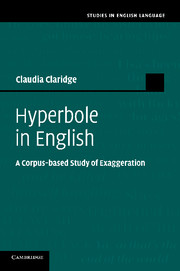Book contents
- Frontmatter
- Contents
- List of figures
- List of tables
- Acknowledgements
- 1 Introduction
- 2 The characteristics of hyperbole
- 3 Realisations of hyperbole
- 4 Using hyperbole: the speaker perspective
- 5 Hyperbole in interaction
- 6 Conventionalisation
- 7 The rhetoric of hyperbole
- Conclusion
- Appendix 1 Modern corpora used (Chapters 1, 2, 3, 4, 5 and 6)
- Appendix 2 Modern sources other than corpora (Chapters 2, 3, 4 and 5)
- Appendix 3 Conventionalisation in dictionaries (Chapter 6)
- Appendix 4 Corpora, dictionaries and texts used for the diachronic investigation (Chapter 6)
- Appendix 5 Sources used in Chapter 7
- References
- Index
1 - Introduction
Published online by Cambridge University Press: 04 February 2011
- Frontmatter
- Contents
- List of figures
- List of tables
- Acknowledgements
- 1 Introduction
- 2 The characteristics of hyperbole
- 3 Realisations of hyperbole
- 4 Using hyperbole: the speaker perspective
- 5 Hyperbole in interaction
- 6 Conventionalisation
- 7 The rhetoric of hyperbole
- Conclusion
- Appendix 1 Modern corpora used (Chapters 1, 2, 3, 4, 5 and 6)
- Appendix 2 Modern sources other than corpora (Chapters 2, 3, 4 and 5)
- Appendix 3 Conventionalisation in dictionaries (Chapter 6)
- Appendix 4 Corpora, dictionaries and texts used for the diachronic investigation (Chapter 6)
- Appendix 5 Sources used in Chapter 7
- References
- Index
Summary
est autem in usu vulgo quoque et inter ineruditos et apud rusticos, videlicet quia natura est omnibus augendi res vel minuendi cupiditas insita nec quisquam vero contentus est: sed ignoscitur, quia non adfirmamus.
[Hyperbole is commonly used even by ignorant people and peasants, which is understandable, as all people are by nature inclined to magnify or to minimise things and nobody is content to stick to what is really the case. We tolerate this habit, because we are not really asserting facts. – my translation, CC]
(Quintilian VIII, 6, 75)Hyperbole as a term has a long tradition; in the sense of ‘exaggeration’ it was already used in classical Greece. Roman rhetoricians, such as Quintilian, deal with the figure of overstatement in their handbooks and from there it has found its way into the European rhetorical tradition. It is found used in diverse sources; the Encyclopædia Britannica mentions love poetry, sagas, tall tales, classical mythology, political rhetoric and advertising as texts containing hyperbole, illustrating the great range of the phenomenon regarding both time and genre. Furthermore, hyperbole is not only an arcane rhetorical figure, but rather, similar to metaphor, it is a common feature of everyday language use (Leech 1983: 146f.). Just like metaphor, it may be wired in the cognitive structuring of our experience: the concept of size, to which exaggeration must primarily be connected, is a very basic and salient one.
- Type
- Chapter
- Information
- Hyperbole in EnglishA Corpus-based Study of Exaggeration, pp. 1 - 3Publisher: Cambridge University PressPrint publication year: 2010



